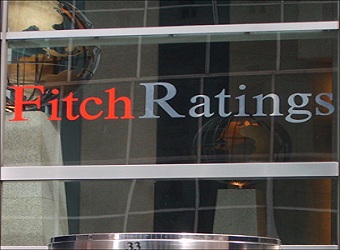Fitch Ratings on Friday revised its outlook on Egypt’s credit rating to stable from negative, citing financial assistance from Kuwait, Saudi Arabia and UAE.
Fitch also affirmed its B-minus rating on Egypt’s long-term foreign and local currency issuer default ratings (IDR).
A crackdown on the Muslim Brotherhood and restrictions on protests have also calmed the political scene, though the country remains deeply polarized and security in North Sinai has worsened, Fitch said.
Key Rating Drivers
The revision of the Outlook reflects the following key rating drivers and their relative weights: High Significant financial assistance from Kuwait, Saudi Arabia and UAE has eased the pressure on reserves, the exchange rate and the budget, and boosted business confidence.
Deposits, grants and project spending worth USD15bn have been pledged to Egypt since the ousting of president Morsi and USD10.7bn has been disbursed.
Interest-free deposits have lifted reserves to over three months of current external payments and allowed the repayment of USD3bn in remunerated deposits to Qatar. The political scene has been calmed through a tough crackdown on the Muslim Brotherhood and restrictions on protests. Public protests have become smaller and rarer and a state of emergency and curfew were lifted in mid-November 2013.
A referendum on a new constitution in January is intended to pave the way for presidential and parliamentary elections later in 2014. Nevertheless, serious political tensions remain.
Society is deeply polarised, political parties are weak and the security situation in North Sinai has worsened. Medium Reduced political disruption and a greater availability of foreign exchange, combined with fiscal and monetary stimulus, are supporting a tentative improvement in the economy.
The latest Purchasing Managers’ Index (PMI; November 2013) was at an all-time high and above 50 (indicating an expanding economy) for the first time since September 2012.
Fitch forecasts real GDP growth to pick up to 3.2% in FY14 (to end June) and 3.8% in FY15, from 2.1% in FY13, although these rates are weak compared with the five-year average to end-FY10 of 6.2% and will be insufficient to prevent unemployment from rising.
Egypt’s IDRs also reflect the following key rating drivers: The general government deficit is substantial. A deficit of 14.1% of GDP was recorded in FY13 due to high expenditure. Higher grants and savings on interest payments stemming from lower interest rates will contribute to a reduction in the deficit to 12% of GDP in FY14. Moderate post-election fiscal consolidation should lower the deficit further in FY15, although it will remain in double digits.
Fiscal flexibility is limited, with interest payments, wages and salaries and subsidies accounting for around 75% of total spending. General government debt has grown rapidly and stood at 89% of GDP at end-FY13 due to domestic financing of the fiscal deficit.
Fitch assumes that public sector banks will retain the capacity to absorb further government debt, although the authorities are also likely to continue to resort to cheaper financing from the central bank. A repayment schedule for the bulk of the USD6.3bn arrears on profit payments to energy companies has been agreed and payments have begun. Egypt is a very small net external debtor.
External debt is low, at 18.9% of GDP, primarily medium- and long-term and contracted on a concessional basis. The current account deficit plus net foreign direct investment is forecast to remain below 2% of GDP, although this is partly due to import suppression.
Rating Sensitivities
The Stable Outlook reflects Fitch’s assessment that upside and downside risks to the rating are currently balanced.
The main factors that could lead to a positive rating action, individually or collectively, are: – Improved political stability, leading to stronger economic performance. – Progress on fiscal and structural reforms that would deliver a material reduction in the budget deficit.
The main factors that could lead to a negative rating action, individually or collectively, are: – A serious breakdown of public order or a severe and sustained period of political violence that further damages the economy. – A failure to reduce the fiscal deficit significantly or a weakening of the willingness of local banks to finance the deficit. – A sizeable decline in reserves, for example caused by disruption to GCC inflows, which would place serious strain on the balance of payments.
Key Assumptions
Fitch assumes that the political environment will be volatile. Fitch expects that bilateral financial support from the GCC will be sufficient to keep import cover around current levels, although a weak balance of payments will prevent the lifting of restrictions on access to foreign exchange.
Fitch does not expect Egypt to reach an agreement with the IMF, although the authorities will make some progress in fiscal consolidation. Fitch forecasts a modest decline in oil prices, with Brent averaging USD100/b over 2014 and 2015, and global food prices to remain stable.



